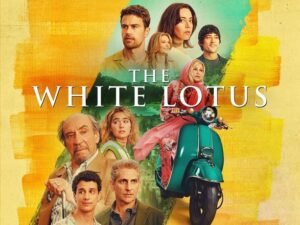The White Lotus – Season 1, Episode 2: “New Day”
Opening Vibe: The Morning After “Arrivals”
Episode 2, “New Day,” begins with a deceptively tranquil mood. It’s a new morning at the White Lotus, and guests are ready to settle into their luxury routines. Yet the episode immediately makes it clear that while the skies are blue and the ocean shimmers, the emotional climate among the characters is anything but sunny. The White Lotus resort is a perfect façade—and inside it, every guest is quietly unraveling.
Shane vs. Armond: The War Over the Room Escalates
One of the episode’s primary tensions continues from Episode 1: Shane Patton’s obsessive grievance over his honeymoon suite. Still convinced the manager gave him the wrong room, Shane fixates on what he believes is a serious insult to his status. Armond (Murray Bartlett), the resort manager, maintains a smile while clearly growing agitated beneath the surface.
Shane insists that Armond “make it right” and implies that his wealthy mother—who booked the suite as a wedding gift—will be involved if he doesn’t. Armond, in an act of passive resistance, plays along with faux hospitality, but refuses to cave. Their interactions become a masterclass in microaggression, passive aggression, and class conflict.
Rachel (Alexandra Daddario), Shane’s wife, is visibly exhausted by the issue. She’s beginning to see that her husband is more interested in appearances and control than enjoying their time together. Her concerns go unacknowledged, and Shane’s inability to let go of a trivial mistake is already driving a wedge between them.
Rachel’s Identity Crisis Deepens
As Shane continues his room crusade, Rachel is left to ponder her new life. She sits by the pool, people-watches, and becomes increasingly uncomfortable with the social role she’s falling into: a trophy wife. She strikes up an awkward conversation with Olivia (Sydney Sweeney) and Paula (Brittany O’Grady), the hyper-literate college girls who sneer at everything around them with intellectual superiority.
Rachel attempts to connect by mentioning she’s a freelance journalist, but Olivia and Paula react with condescension. They mock her in veiled terms, labeling her a “content girl”—someone who churns out shallow listicles rather than real journalism. Rachel is stung. The interaction triggers her fear that she’s abandoning her independence and identity for a life of luxury she may not even want.
Nicole and Mark: Marriage, Power, and Masculinity
Nicole Mossbacher (Connie Britton), the alpha CFO and family matriarch, continues to exude control and confidence, while her husband Mark (Steve Zahn) sinks deeper into personal crisis. Mark receives news from the doctor that his testicular swelling is not cancer—but the relief doesn’t bring joy. Instead, it leads to confusion and helplessness. Mark was almost enjoying the existential gravity of a cancer scare; without it, he’s just back to feeling irrelevant.
Nicole, meanwhile, is focused on maintaining order and ignoring Mark’s existential dread. She dismisses his emotional floundering, advising him to “go enjoy the day.” He attempts to bond with his son Quinn (Fred Hechinger), but Quinn is absorbed in his screen, detached from both parents and nature.
Mark’s emasculation becomes a running theme. He feels left behind in his own family—out-earned by his wife, mocked by his daughter, and unable to relate to his son. The show begins to paint his character with shades of pathetic vulnerability, setting up a possible trajectory of overcompensation later.
Olivia and Paula: Privileged “Wokeness” on Display
Olivia and Paula continue their trend of lounging by the pool, reading philosophy and post-colonial literature, and silently judging everyone around them. Their interactions with others are laced with sarcasm and intellectual elitism, but their moral superiority rings hollow. Though they pride themselves on being “aware,” they are still fully enjoying the luxuries of a resort built on commodified Hawaiian culture and exploitative tourism.
Their friendship also starts to reveal subtle tensions. While they appear inseparable, Paula is not part of the Mossbacher family, and moments of microaggression start to slip in. Olivia tends to dominate the space and the conversation, while Paula appears slightly uneasy—especially when outsiders, like Rachel, interrupt their insular bubble.
Tanya and Belinda: A Needy Heiress Latches On
Tanya McQuoid (Jennifer Coolidge) continues her emotional unraveling. Following her breakdown during a massage in Episode 1, she clings to spa manager Belinda (Natasha Rothwell) like a spiritual savior. Tanya is lonely, grieving her mother’s death, and seems incapable of functioning without emotional support.
She invites Belinda to dinner, showering her with attention and vague promises of funding a wellness business for her. Belinda, while flattered and compassionate, clearly feels overwhelmed. She’s a professional service worker being sucked into Tanya’s vortex of neediness and spiritual yearning. The dynamic is unsettling: Tanya wants to help Belinda, but only if Belinda continues to soothe her neuroses. It’s unclear whether Tanya sees Belinda as a real person or simply another emotional service provider.
Lani’s Absence and Armond’s Fracture
Armond is informed that Lani, the trainee who gave birth in the employee area during Episode 1, will not be returning to work. This sends him into a quiet tailspin. The resort is understaffed, and he is forced to do more tasks himself—like carrying luggage and dealing with petty guest complaints. His forced cheer begins to crack, revealing the emotional and mental toll of managing wealthy guests who see the staff as invisible servants.
This tension is palpable as Armond continues to butt heads with Shane. Their subtle war is becoming a darkly comedic centerpiece of the episode, and Armond’s weariness and sarcasm begin to show.

Cultural Performance and the Illusion of Paradise
Throughout the episode, there’s a recurring motif of Hawaiian culture being staged for the benefit of guests. The resort hosts a traditional Hawaiian hula and chant ceremony. While the performance is meant to showcase “authentic” culture, it’s clear that it’s curated for a tourist audience.
The guests, oblivious to the deeper meaning behind the rituals, treat it as dinner entertainment. Mark, still grappling with masculinity, tries to bond with Quinn during the event, but it’s awkward. Tanya watches the performance while holding Belinda’s hand, overwhelmed by feelings she can’t articulate.
The episode subtly critiques how Western tourism reduces native culture to digestible spectacle, stripping it of history and pain. The guests never acknowledge the colonial violence embedded in the Hawaiian landscape—they just sip their cocktails and enjoy the show.
Closing Scenes: Cracks Widen
As the sun sets, several character arcs begin to diverge:
– Shane continues plotting his revenge against Armond, hinting at escalating the complaint to higher management.
– Rachel stares blankly at her laptop, wondering what she’s doing on this honeymoon and in this marriage.
– Mark, emboldened by his good health news, attempts to reconnect with his family—but feels sidelined and invisible.
– Tanya, high on emotional release and prescription medication, pitches the idea of financing a wellness center to Belinda, who smiles politely but seems wary.
– Olivia and Paula gossip about everyone at the resort, unaware of their own privilege or the irony of their judgments.
The final moments are quiet, with characters scattered across the resort—each absorbed in their thoughts, their dissatisfaction brewing under artificial serenity. There’s no explosive climax, but the tension is thick, like a storm waiting to break.
Conclusion: Tension in Paradise
Episode 2 of *The White Lotus*, “New Day,” doubles down on the show’s core themes: the psychological rot beneath wealth, the fragility of relationships built on image and control, and the vast divide between service and indulgence. Though no major plot events occur—no deaths, no affairs (yet), no explosions—the episode excels in layering character depth, micro-conflicts, and emotional dissonance.
Everyone is performing: the staff for the guests, the guests for each other, the spouses for their partners. And all the while, the camera lingers on the sea and sky—calm and endless—as if mocking the chaos it contains.
By the end of “New Day,” it’s clear that the White Lotus resort is not a place for healing or joy—it’s a pressure cooker of entitlement, denial, and slow-burning dissatisfaction. And something, or someone, is bound to snap.












Post Comment